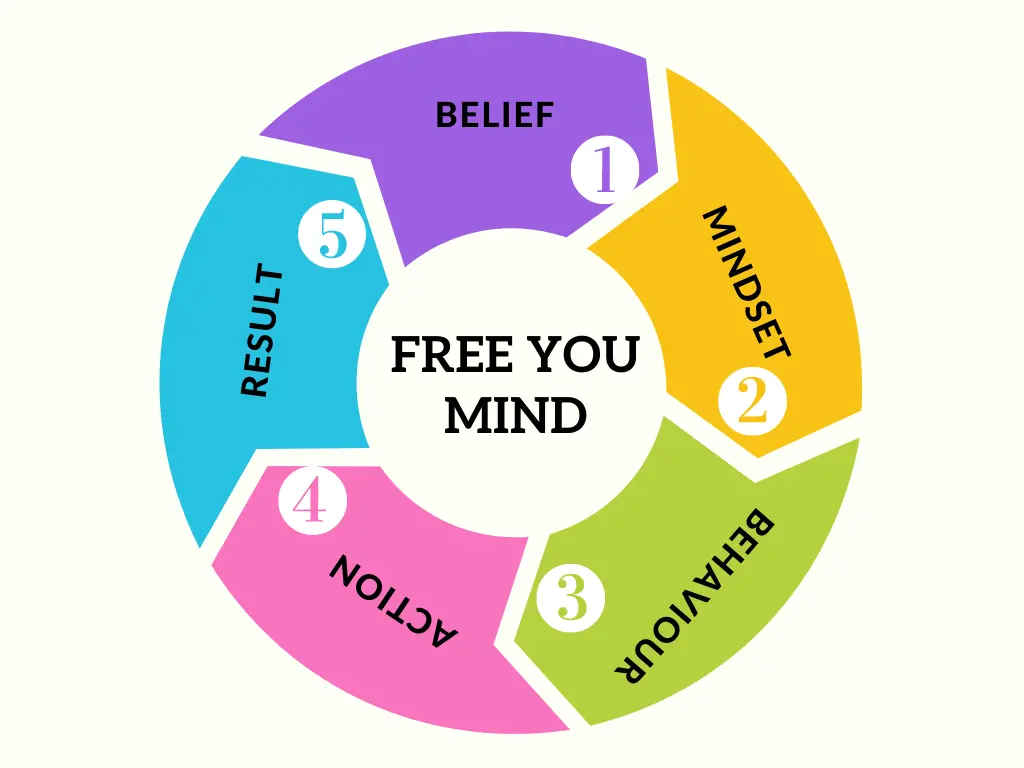Money has been a source of stress and worries in many people’s lives. That is why it is vital to transform your money beliefs. Poor money beliefs can affect your relationships, health, and even mental health. And this does not have to be the case.
Research 2021 indicated that 63% of Americans, 60% of Australian and 33% of UK citizens were financially stressed when surveyed. Furthermore, the research has revealed that 90% of Americans, 84% of Australians, and 80% of UK citizens surveyed agreed that financial beliefs contribute to achieving their financial objectives.
Your money belief plays a vital role in unlocking a world of financial freedom and abundance. The reality is most of us are not taught how to have a good relationship with money. There are many resources on the internet to help you transform your relationship with money, focusing on practical ways.
In my experience in business and as a financial well-being coach, you can transform your money beliefs and improve your relationship with money. Let’s explore the 4 steps that will help you improve your relationship with money, and let’s walk through them together.
1. Identify.
2. Acknowledgement.
3. Reframe.
4. Take Action.
Let’s first explore your money beliefs and see why they are crucial on the road to transforming them.
The content below will cover the following;
- What is money belief?
- Why transforming your money beliefs is important to know?
- How do you form a money belief?
- How does money belief impact or benefit us?
- What is a limiting belief about money?
- 4 easy steps to transform your money belief.
What is a money belief?
Belief is the rules that we make up in our heads about how the world works. Belief provides us with certainty, which is why changing them is quite challenging. Belief also is a perspective of our reality, and for this reason, they control our focus and reality. Belief also helps you to create certainty in life, as life itself is full of uncertainty.
For example: Personal Worth with money. If you believe you are worth $150,000 and find a new job offering you more money, let’s say $250,000. Unconsciously, you will find many reasons for not taking the job by telling yourself lies such as you will have to work long hours, which will take you away from your friends and family. You will sabotage yourself by preventing yourself from applying for the job.
Why transforming your money beliefs is important to know?

The chart above shows how to transform your life by starting with your belief first.
Understanding your money belief is vital because it directly relates to your financial well-being. There is a lot of information online on this topic, and many focus mainly on practical ways of changing your behaviour and actions. In my many years of coaching people to achieve business goals and money coaching, dealing with their beliefs first has made shifting behaviour much easier. Everyone has good intentions when setting a goal. But when it comes to achieve the goal, the core belief has to support the behaviour shift needed to keep going.
To have a sustainable result and transform your relationship with money, you need to identify the root cause. And understand why your current belief is not serving you well for a healthy relationship with money. To do that, you need to explore your belief about money. Because the way it works is that your money beliefs influence your money mindset (thinking), which shapes your behaviour and, in turn, dictates your actions which give us a result. That result will reinforce your original belief even if that result is a negative result. Refer to my picture above to describe my thoughts.
How do you form a money belief?
Your belief about money is formed from events you have seen and heard since childhood. Your experience with these events is from interactions you encountered with the following;
Your parents: How you heard your parents deal with money, how they talk about money in front of you, impact your relationship with money. If you experienced your parent regularly fighting over money, then the way you perceive money today mean stress and conflict. This is because your brain will try to make sense of your experience to protect you from uncertainty.
My experience about money when I was growing up is that my parents fought a lot about money. In my adulthood, I would have created a scarcity mindset. I am the king of finding savings and a good deal. I felt terrible spending money because I didn’t want money to be a cause of conflict between my wife and I. I am telling you this because we all have certain money beliefs that are not serving us well, and we need to be consciously aware of them.
Your friends: The friends you hang around influence the way you view money and your relationship with money. Suppose the friends you surround yourself with have an abundant mindset about money. In that case, it will shape your relationship with money and unconsciously lead you to the same positive belief about money. On the other hand, if you carry a scarcity mindset about money, you might compare yourself with your friends. This is not a healthy way to manage your finances.
“You are the average of the five people you spend the most time with.” Jim Rohn
Your environment: Where you grow up or live can impact your relationship with money as you will identify with the people around you. Often the environment in which you find yourself (where, when and with whom) results from your belief and self-identify.
If the location you grow up and the people have a negative relationship with money or limiting belief about money, then unconsciously, you will adopt the same belief.
How does money belief impact or benefit us?
Belief provides us with meanings, direction and certainty.
Belief is a fundamental part of human experience that shapes our thoughts, feelings, behaviour and actions. It provides us with meaning, direction, and certainty in a complex and uncertain world. Beliefs help us make sense of the world and give us a sense of purpose and identity.
Belief can also support our happiness and success.
Belief can be a powerful force in our lives and can play a significant role in our happiness and success. When we believe in our abilities, we gain the confidence and motivation to work towards our goals and overcome obstacles.
Belief can also derail our happiness and success. (Limiting belief)
While belief can be a powerful force that supports our happiness and success, it can also have the opposite effect if it becomes limiting. Limiting beliefs are negative or self-defeating thoughts that hold us back and prevent us from reaching our full potential. They can be based on inaccurate or outdated information and keep us from pursuing our goals or trying new things.
What is a limiting belief about money?
A limiting belief about money is a belief that limits you from and does not serve you well. It will provide you with reasons for not doing what you need to do to bring success to your life and improve your relationship with money. A money limiting belief is a belief that holds you back from having a good relationship with money. When you have to shift your belief about money, it will create a feeling of uncertainty, and your mind will fight it and resist the new belief.
Why do we form money limiting beliefs?
– Limiting belief has a positive intention that lies behind them.
– Limiting belief acts as a protective mechanism to prevent us from doing what we feel uncomfortable with.
– Limiting belief acts as a security blanket that provides certainty and comfort.
There are many limiting beliefs examples such as money does not grow on trees, I am not good with money, I am not smart enough to make money etc. Having these limiting beliefs does not necessarily serve you well. On the other hand, there are examples of belief or abundant mindset where the belief or mindset is serving you well.
Transforming your relationship with money can be a challenging task. You don’t have to be an expert in following these 4 simple and easy steps. Taking proactive steps to help with your money limiting belief and scarcity mindset will improve your relationship with money. It paves the way for you to take practical action in transforming your relationship with money. The steps below will help you to deal with the root cause of your money beliefs. Let’s take a look at the 4 steps on how to change your money limiting belief and money mindset.
4 STEPS TO TRANSFORMING YOUR MONEY BELIEFS AND MINDSET.
Identify.
Let’s do an activity to help you identify your beliefs about money. What I want you to do with this activity is not to edit or disregard your thoughts. I want you to be brutally honest with answering the questions. The outcome of this activity is so worth it to understand your belief and mindset about money. It will be the process of you being consciously aware and revealing your inner thoughts of your money belief.
The questions will help you navigate your thoughts and feelings about your money belief for each stage of your life past, present and future. All your responses will provide you with a map, and there is no positive or negative. It’s all vital information in your subconscious mind which helps you to articulate your money stories.
Complete the Identify Money Belief Questionnaire to help understand your money belief. It is also called your money story.
“Awareness is all about restoring your freedom to choose what you want instead of what your past imposed on you”. Deepak Chopra
Acknowledgement
Once you have completed your Identify Money Belief Questionnaire, you have your score, which provides you with an ideal position to understand your money belief. Remember, the insights you have discovered in the previous activity are a great tool to help you acknowledge your money belief and mindset.
Acknowledging those money beliefs that do not serve you well means you are being kind to yourself and therefore remove the feeling of pain, guilt, and ashamed.
For each question you have scored against scarcity mindset, take time to acknowledge that it is ok to have had that belief as you did not know better. To acknowledge said these 3 powerful words “Can’t change it”. It also reinforces your brain that you can’t change what already happen and support the ability to change. Furthermore, it can assist in reducing the influence and power of negative beliefs and memories attached to them.
Now that you understand that scarcity mindsets will not serve you well to transform your relationship with money, it’s time to move to the next step in reframing your money belief.
Reframe
Reframe your money belief is about flirting you’re the idea of possibilities. Shifting your belief is a challenging process because it demands your full attention. You would have to replace it with a different money belief and change the words and language you tell yourself.
If you have a belief such as “I am not good with money”, you will find examples in your life to justify and look for proof for that belief, even if a damaging one. Your mind is an amazing machine, and whatever you look for, you will find it. And whatever you focus your attention on, you will get more. It does not matter whether you have succeeded 99 times before.
One of the easiest ways to reframe your language about your money belief is by adding the word YET at the end.
For example, “I am not good with money YET”. Adding the word YET indicates that you may lack experience or knowledge when it comes to managing your finances, but you also recognize and acknowledge that you have room for improvement.
These 3 letter words help you to change your outlook and flirt with the ideas of possibilities. Carol Dweck outlines this in her book ‘Mindset’. “Those who achieve success believe in their most basic abilities.” The word you use to describe yourself influences how you view yourself by adding the word YET at the end to remind you that you can learn and improve.
For more ideas and examples to help you reframe your limiting belief about money, I have more resources on reframing money beliefs for you to access for free, with many examples of what you can say to reframe your language and more examples of questions you can ask yourself to take your reframing to the next level and help you take action.
Take Action
Once you have reframed your money belief with the questions and examples provided to you, it’s time to take action and turn the reframing into a habit.
You can take many actions to make positive changes and shift to a more abundant mindset and belief. Here are some of the most effective options;
- Learn from others. One of the best ways to learn from others is by reading blogs like this and financial literacy books. Educating yourself is the best gift you can give yourself. Planting the knowledge of how to have better money relationships is the best gift you can give yourself. I have put together a list of my favourite financial literacy books and money mindset books with a key takeaway of each book to provide you with a taste of the content
- Visualization is an effective method for developing a positive money mindset. Close your eyes and imagine yourself in your ideal financial situation. Imagine yourself in that situation and feel the excitement of living a life where you don’t have the stress and worries about money. This will assist you, in the beginning, to believe that it is possible. Visualize that situation in the present as if you are living in the moment.
- Journaling is an excellent way to investigate and comprehend your financial mindset. Write down your thoughts and feelings about money, and then investigate why you feel that way. Use some of the Reframing questions in our resource section to help you understand yourself better by noting your responses.
- Creating a personal budget can be a daunting task. Still, it is a necessary step towards reaching your financial objectives as it will highlight how your money is going out and what money is coming in. There are different types of budgets. The most common budget is 50/30/20, Zero-sum, Envelop, or Flexible. Choosing the budget that suits your needs can feel like an impossible task. You can explore the blog I created on budgeting to share with you the purpose of each budget so you can choose one that suits your lifestyle.
- Increasing your income can assist you in achieving financial stability and security. It also allows you to save more, invest in your future, and afford a higher living standard. Furthermore, having a higher income will enable you to live a rich life. It will create an opportunity for you to make a difference in your community through charitable giving.
- Practising gratitude can improve both mental and physical well-being. It can assist in shifting focus from a negative mindset and experiences to positive aspects of life. Therefore increasing happiness and improving relationships. Furthermore, practising gratitude can aid in reducing stress and improving your sleep. It is a way to recognize and appreciate the good things in your life.
- Motivational quotes can assist as a source of inspiration and encouragement. It can remind you to stay focused on your financial objectives and to keep going.
- Professional support and advice. Seeking professional support is another option for you in taking action to transform your relationship with money. Too often there is a stigma associated with seeing and talking to a professional. There’s nothing wrong in seeking help from someone else. It should be part of your toolkit.





Hi, this is a comment.
To get started with moderating, editing, and deleting comments, please visit the Comments screen in the dashboard.
Commenter avatars come from Gravatar.
Pingback: Rewrite Your Money Story: One Decision Can Change Your Life - CreateMaintainGrow
Pingback: Overcoming Money Scarcity: A Guide to Financial Freedom and Abundance - CreateMaintainGrow
Pingback: 3 Ways to Overcome the fear of Spending Money. - CreateMaintainGrow
Pingback: 21 motivational Quotes about Money. - CreateMaintainGrow
Pingback: Best 7 books to unlock the secret of your money mind. - CreateMaintainGrow
Pingback: Overcoming Limiting Belief About Money - Embrace Your Money Potential - CreateMaintainGrow
Pingback: Best 3 Budgeting Strategies for BEGINNERS for 2023! - CreateMaintainGrow
Pingback: Supercharge Your Savings: 5 Effective Saving Money Strategies. - CreateMaintainGrow
Pingback: 15 Creative Ways to Save Money Fast on Low Income for Free
Pingback: Cracking the Code of Techniques for Financial Goal Setting.